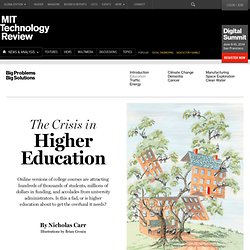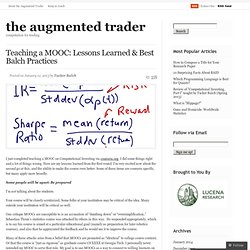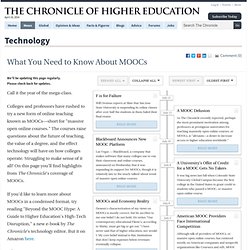

Disrupting Class, Expanded Edition: How Disruptive Innovation Will Change the Way the World Learns: Clayton Christensen, Curtis W. Johnson, Michael B. Horn: 9780071749107: Amazon.com. No Significant Difference - Presented by WCET. The Crisis in Higher Education. A hundred years ago, higher education seemed on the verge of a technological revolution.

The spread of a powerful new communication network—the modern postal system—had made it possible for universities to distribute their lessons beyond the bounds of their campuses. Anyone with a mailbox could enroll in a class. Frederick Jackson Turner, the famed University of Wisconsin historian, wrote that the “machinery” of distance learning would carry “irrigating streams of education into the arid regions” of the country. Sensing a historic opportunity to reach new students and garner new revenues, schools rushed to set up correspondence divisions. By the 1920s, postal courses had become a full-blown mania.
The hopes for this early form of distance learning went well beyond broader access. We’ve been hearing strikingly similar claims today. The excitement over MOOCs comes at a time of growing dissatisfaction with the state of college education. But not everyone is enthusiastic. Teaching a MOOC: Lessons Learned & Best Balch Practices. I just completed teaching a MOOC on Computational Investing via coursera.org.

I did some things right and a lot of things wrong. Here are my lessons learned from the first round. I’m very excited now about the second go at this, and the ability to make the course even better. Some of these items are coursera specific, but many apply more broadly. Some people will be upset: Be prepared I’m not talking about the students. Your course will be closely scrutinized. One critique MOOCs are susceptible to is an accusation of “dumbing down” or “oversimplification.” Many of these attacks arise from a belief that MOOCs are promoted as “identical” to college course content; Or that the course is “just as rigorous” as graduate course CS XXXX at Georgia Tech.
That being said, I do believe that we can produce and deliver “rigorous” content via MOOCs, and many are working on that. About MOOC Completion Rates: The Importance of Student Investment. I just finished teaching a Massive Online Open Class (MOOC) titled “Computational Investing, Part I” via coursera.org. 53,000 people “enrolled,” which is to say they clicked a “sign up” button.

How many finished? Related post regarding lessons learned Completion rates are low, but that statistic is misleading Much of the criticism of MOOCs centers on supposedly low completion rates. And these rates do seem low when compared to completion rates of regular university courses. One of the 53,000 students in my class watches a lecture video. What does it cost a student to enroll in a course? The economics are significantly different for a student at a traditional university than for a student starting a MOOC. At a regular university all of the students starting a course have paid tuition, they have moved to an apartment or dorm near the university, and they’ve set aside time to complete the course. What’s the cost of failure or withdrawal? What are the implications for completion rates?
Like this: Dave's Educational Blog. What You Need to Know About MOOCs - Technology. We'll be updating this page regularly.Please check back for updates.

Call it the year of the mega-class. Colleges and professors have rushed to try a new form of online teaching known as MOOCs—short for "massive open online courses. " The courses raise questions about the future of teaching, the value of a degree, and the effect technology will have on how colleges operate. Struggling to make sense of it all? On this page you’ll find highlights from The Chronicle's coverage of MOOCs. If you'd like to learn more about MOOCs in a condensed format, try reading "Beyond the MOOC Hype: A Guide to Higher Education's High-Tech Disruption," a new e-book by The Chronicle's technology editor.
What are MOOCs? MOOCs are classes that are taught online to large numbers of students, with minimal involvement by professors. Why all the hype? Advocates of MOOCs have big ambitions, and that makes some college leaders nervous. These are like OpenCourseWare projects, right? Sort of. Who are the major players? EdX.